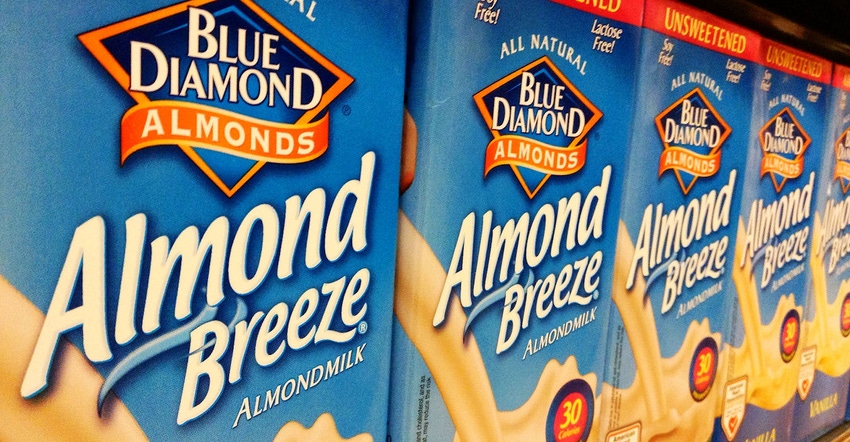New research shows there is misunderstanding on nutritional values associated with milk alternatives compared to dairy milk.

Dairy milk and plant-based milk alternatives are purchased with nutrition in mind, yet many consumers are not aware of nutritional distinctions between products, according to a new survey by IPSOS commissioned by Dairy Management Inc.
Plant-based milk alternatives have grown in number and volume over the years, so understanding consumers’ expectation of “milk” is important, especially as the Food & Drug Administration is reviewing the standards associated with milk. The dairy industry has criticized the use of the term "milk" for plant-based alternatives, such as soy milk or almond milk, and asked FDA to restrict the use of the term if the product isn’t from a cow.
Almond milk, soy milk and coconut milk are perceived as having the same or more vitamins, protein or other key nutrients than milk, the survey found. In addition, the majority of adults believe that dairy milk and plant-based milk alternatives have the same nutritional content.
The survey found that 73% of consumers believe that almond-based drinks have as much or more protein per serving than milk. However, milk has eight times as much protein.
“The plant-based food and beverage industry has used FDA inaction as a cover to sell consumers a product that is heavily processed to look like real milk but doesn’t deliver what matters most: a consistent, high-quality package of nutrients,” National Milk Producers Federation (NMPF) president and chief executive officer Jim Mulhern said in remarks at NMPF’s annual meeting in Phoenix, Ariz. “This is contrary to the national goal of a healthy population and FDA’s mission to promote transparency and fairness."
NMPF said misinformation was found to be more prevalent among those who bought only plant-based drinks. Of those buyers, 68% strongly or somewhat agreed that those drinks have the same nutritional content as dairy milk.
Most consumers either do not know the number of essential nutrients and vitamins in plant-based milks or believe it depends on the source. Meanwhile, buyers of plant-based beverages are more inclined to say the products have the “same” or “more” essential nutrients than dairy milk, the survey found.
To specifically look at what matters regarding use of the term “milk,” the survey asked: “Why would a manufacturer label a product milk if it does not contain milk?” The number-one answer for all buyers was that the nutritional content is similar to dairy milk, with 53% respondents agreeing.
Taste and price are more important drivers of dairy milk purchases, while health, digestive benefits and longer shelf life are more important factors driving plant-based milk purchases. Nutrition is equally important to both purchasing groups, but it ranks higher in buyers who exclusively purchase plant-based milk alternatives, the survey found.
Mulhern said milk labeling “is much more than a sideshow over whether consumers can tell the difference between an almond or a cow.” FDA needs to help consumers by “clearly distinguishing between true milk and water-heavy, nutrition-poor imitators,” he said.
According to a recent survey from the International Food Information Council Foundation, a significant majority of people understand correctly which products contain or do not contain milk from cows when shopping for various types of products labeled using the word “milk.” About three-quarters of Americans understand that plant-based milk products do not actually contain cow’s milk (75% for soy milk and almond milk, 74% for coconut milk, 73% for rice milk and 72% for cashew milk). Fewer than 10% believe that any of those products contain cow’s milk, while the remainder say they don’t know (20% for cashew milk and rice milk, 18% for coconut milk and 16% for soy milk and almond milk).
About the Author(s)
You May Also Like




.png?width=300&auto=webp&quality=80&disable=upscale)
